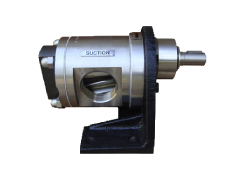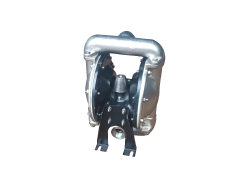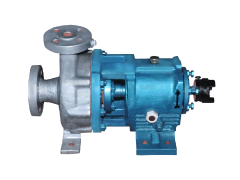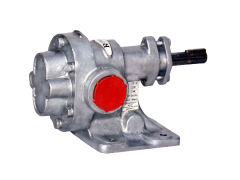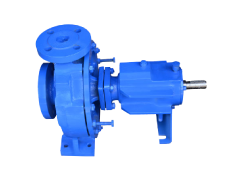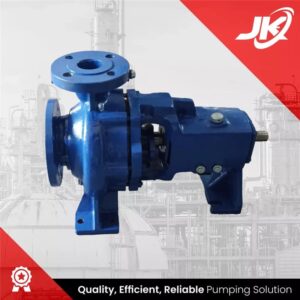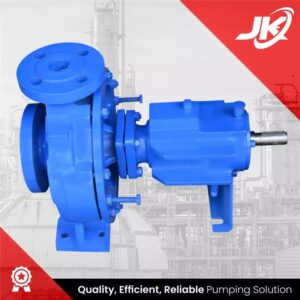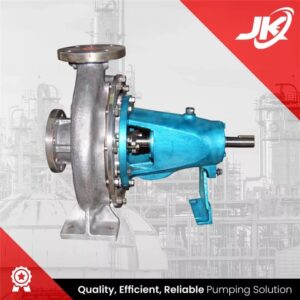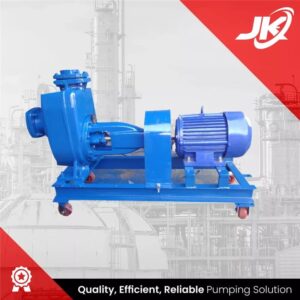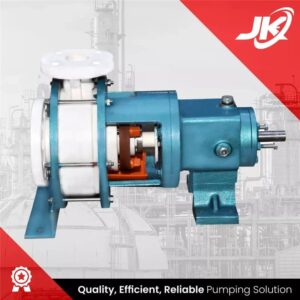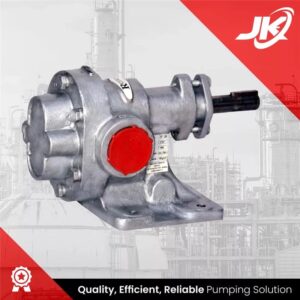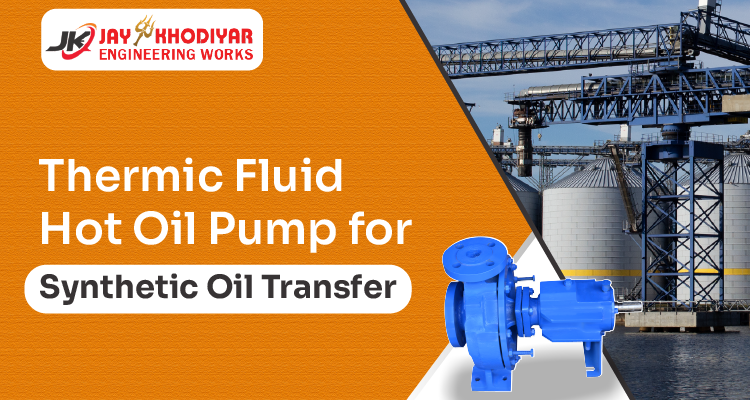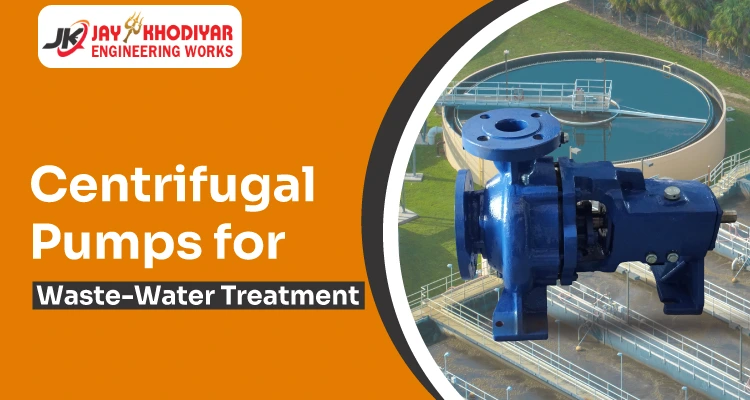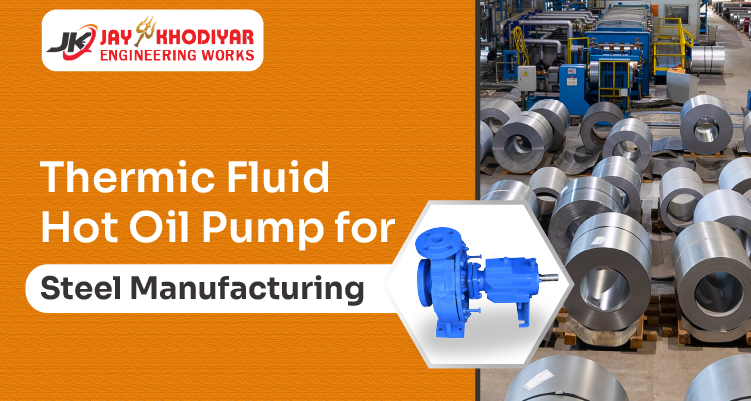
Air Cooled Pump for Food and Drug Industry
March 27, 2025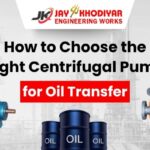
How to Choose the Right Centrifugal Pump for Oil Transfer
May 8, 2025Ever wondered what keeps industrial fluids moving efficiently across manufacturing plants? Industrial pumps are the unsung heroes that power countless operations across various sectors. These mechanical marvels transfer fluids from one place to another, playing a crucial role in industries ranging from chemical processing to agriculture.
At Jay Khodiyar, we've spent over 25 years perfecting these essential machines. Our expertise allows us to guide you through the complex world of industrial pumps with clarity and precision.
In this comprehensive guide, we'll explore the diverse family of industrial pumps, their applications, and how to choose the right one for your specific needs.
Why Understanding Pump Types Matters
Selecting the wrong pump type can lead to operational inefficiencies, increased maintenance costs, and even complete system failure. The right pump, however, ensures smooth operations, energy efficiency, and extended equipment life.
Did you know that improper pump selection accounts for nearly 20% of premature equipment failures in industrial settings? This statistic highlights why knowledge about different pump types isn't just useful—it's essential for operational success.
Whether you're handling corrosive chemicals, thick slurries, or clean water, understanding the distinct advantages of each pump type helps you make informed decisions for your facility.
Common Types of Industrial Pumps
Centrifugal Pumps: The Industry Workhorses
What are centrifugal pumps? These dynamic powerhouses use rotational energy to move fluid through a system. When the impeller spins rapidly, it creates centrifugal force that propels the fluid outward from the center of rotation.
Why choose them? They excel in applications requiring high flow rates with moderate pressure. Their simple design means fewer moving parts, translating to lower maintenance requirements and operational costs.
Jay Khodiyar's centrifugal pumps feature precision-engineered impellers that maximize efficiency while minimizing energy consumption. Our models can handle flow rates from 100 to 1000 m³/hour with ease.
Applications include:
- Water supply and distribution systems
- HVAC cooling towers
- Irrigation networks
- Wastewater treatment facilities
- Food and beverage processing
Types of Centrifugal Pumps
| Type | Best For | Key Features | Typical Industries |
|---|---|---|---|
| End Suction | General applications | Compact design, versatile | Utilities, Municipal |
| Split Case | High-capacity needs | Easy maintenance, reliable | Power plants, Water utilities |
| Multistage | High pressure applications | Multiple impellers, efficient | Oil & gas, Boiler feeding |
| Submersible | Underwater operation | Sealed motor design, portable | Mining, Construction |
| Self-Priming | Locations with air entrainment | Can handle air in fluid, reliable start | Agriculture, Flood control |
Air Cooled Pumps: Keeping Cool Under Pressure
What makes air cooled pumps special? As the name suggests, these pumps utilize air for cooling instead of liquid cooling systems. This design prevents overheating during continuous operation in demanding environments.
Why consider them? They eliminate the need for additional cooling water systems, making them ideal for remote locations or applications where water is scarce or expensive.
Our Jay Khodiyar air cooled pumps incorporate advanced heat dissipation fins and thermally optimized designs that maintain safe operating temperatures even in continuous duty cycles.
Typical applications include:
- Oil refineries with high ambient temperatures
- Desert or remote installations
- Continuous process operations
- Areas with limited water supply
- Mobile pumping units
Air Cooled Pump Benefits
- Reduced water consumption and associated costs
- Simplified installation without cooling water piping
- Lower maintenance requirements
- Environmentally friendly operation
- Reliable performance in high temperature environments
Chemical Pumps: Handling the Tough Stuff
What sets chemical pumps apart? Designed specifically to handle corrosive, toxic, and aggressive fluids, these specialized pumps feature corrosion-resistant materials and enhanced sealing systems.
Why are they essential? Standard pumps quickly deteriorate when exposed to harsh chemicals, leading to dangerous leaks, equipment damage, and production downtime. Chemical pumps prevent these costly scenarios.
Jay Khodiyar's chemical pumps utilize premium materials like duplex stainless steel, Hastelloy, and advanced polymers to resist corrosion while maintaining structural integrity under challenging conditions.
Common chemical pump applications include:
- Acid and alkali transfer
- Pharmaceutical manufacturing
- Chemical processing
- Wastewater treatment
- Electroplating operations
Chemical Pump Material Selection Guide
| Chemical Type | Recommended Materials | Avoid Materials | Special Considerations |
|---|---|---|---|
| Strong Acids | PTFE, PFA, Hastelloy C | Carbon steel, Aluminums | Double mechanical seals |
| Caustic Solutions | PP, PVDF, 316L SS | Brass, Bronze | Specialized gaskets |
| Solvents | 316L SS, Alloy 20 | Standard elastomers | Explosion-proof motors |
| Oxidizers | Titanium, Zirconium | Most metals | Secondary containment |
| Slurries | Hard-faced materials | Soft metals | Open impeller design |
Mud Pumps: Masters of Slurry Handling
What exactly are mud pumps? These robust machines are specifically engineered to transport slurries containing solids, sludges, and abrasive materials that would quickly damage conventional pumps.
Why choose a mud pump? When dealing with high-solid content fluids, standard pumps fail rapidly due to internal wear and clogging. Mud pumps feature reinforced components and special designs that resist abrasion and prevent blockages.
Jay Khodiyar mud pumps incorporate wear-resistant materials like high-chrome iron and tungsten carbide in high-wear areas, extending service life even when pumping highly abrasive slurries.
Key applications include:
- Drilling operations
- Mining and mineral processing
- Dredging projects
- Construction dewatering
- Waste sludge transfer
Mud Pump Selection Factors
- Solid content percentage in slurry
- Particle size and abrasiveness
- Required flow rate and pressure
- Operational duty cycle
- Installation environment
- Maintenance accessibility
- Power source availability
PP Pumps: The Polymer Powerhouses
What makes PP pumps unique? Constructed primarily from polypropylene, these chemically resistant pumps handle corrosive liquids while remaining lightweight and cost-effective compared to metal alternatives.
Why consider PP pumps? They offer excellent chemical resistance to many acids, bases, and solvents at a fraction of the cost of exotic metal alloys. Their lightweight construction also simplifies installation and maintenance.
At Jay Khodiyar, our PP pumps feature reinforced designs that overcome the traditional strength limitations of polymer pumps, allowing them to handle more demanding applications than conventional plastic pumps.
Ideal applications include:
- Chemical transfer and dosing
- Plating solutions handling
- Laboratory fluid systems
- Swimming pool circulation
- Light industrial processing
PP Pump Advantages
| Advantage | Explanation | Business Benefit |
|---|---|---|
| Corrosion Resistance | Impervious to many chemicals | Reduced replacement frequency |
| Lightweight | Easier handling and installation | Lower labour costs |
| Cost-Effective | Lower material cost than exotic metals | Better ROI |
| Food Safe | Non-contaminating material | Suitable for food processing |
| Non-Sparking | Inherently non-metallic | Safer in flammable environments |
Rotary Gear Pumps: Precision Fluid Control
What defines rotary gear pumps? These positive displacement pumps use meshing gears to create sealed chambers that transport fluid from intake to discharge with exceptional accuracy and consistency.
Why are they valuable? When precise flow rates matter, rotary gear pumps deliver unmatched performance. Their ability to handle high-viscosity fluids with minimal pulsation makes them ideal for metering applications.
Jay Khodiyar's rotary gear pumps feature precision-machined gears with tight tolerances that minimize internal slippage, ensuring accurate flow rates even with viscous materials like oils, adhesives, and resins.
Common applications include:
- Lubricating oil transfer
- Fuel oil handling
- Paint and coating circulation
- Food product transfer (chocolate, syrups)
- Polymer and resin processing
Rotary Gear Pump Features
- Consistent flow independent of discharge pressure
- Self-priming capability when wetted
- Excellent performance with high-viscosity fluids
- Low internal turbulence for shear-sensitive products
- Bidirectional operation when needed
- Low pulsation output for smooth fluid transfer
Specialized Industrial Pump Variations
Magnetic Drive Pumps: The Leak-Free Solution
What makes magnetic drive pumps special? Instead of mechanical seals, these innovative pumps use magnetic coupling to transfer power from the motor to the impeller, eliminating shaft penetration and potential leak points.
Why are they important? In applications where leakage presents safety hazards or contamination risks, magnetic drive pumps provide the ultimate containment solution while reducing maintenance needs.
Jay Khodiyar's magnetic drive pumps feature high-strength rare earth magnets that ensure reliable power transfer even in demanding applications, combined with advanced bearing materials for extended service life.
Ideal applications include:
- Toxic chemical handling
- Valuable product transfer
- Sterile pharmaceutical processing
- Nuclear plant fluid systems
- Semiconductor manufacturing
Submersible Pumps: Going Below the Surface
What distinguishes submersible pumps? These specialized units feature a hermetically sealed motor directly coupled to the pump body, allowing the entire assembly to operate while completely submerged in the pumped liquid.
Why choose submersible design? They eliminate priming problems, reduce NPSH concerns, save space, and operate quietly. Their self-cooling design allows for continuous duty even in challenging conditions.
Jay Khodiyar submersible pumps incorporate IP68-rated motor enclosures with multiple redundant sealing systems that prevent liquid intrusion even during extended underwater operation.
Common applications include:
- Dewatering operations
- Sewage handling
- Well water extraction
- Drainage systems
- Flood control
Diaphragm Pumps: Air-Powered Versatility
What are diaphragm pumps? These positive displacement pumps use a flexible membrane that moves back and forth to create suction and discharge, often powered by compressed air rather than electricity.
Why are they valuable? Their ability to run dry without damage, handle solids in suspension, and operate without electricity makes them indispensable in certain applications.
Jay Khodiyar's diaphragm pumps feature high-durability elastomer diaphragms reinforced with fabric that resist fatigue and chemical attack, ensuring long service life even in challenging applications.
Ideal uses include:
- Sump drainage
- Paint transfer
- Ceramic slip handling
- Construction site dewatering
- Spill response operations
How to Choose the Right Industrial Pump
Assessing Your Pumping Requirements
The foundation of proper pump selection begins with a thorough understanding of your specific requirements. Consider these crucial factors before making your decision:
1. Flow rate needs:
What volume of fluid must be moved per unit time? This is typically measured in gallons per minute (GPM) or cubic meters per hour (m³/h).
2. Head pressure requirements:
What is the total pressure the pump must overcome? This includes both static lift and friction losses throughout the system.
3. Fluid characteristics:
Consider viscosity, temperature, corrosiveness, solid content, and specific gravity. These properties significantly impact pump selection.
4. Operational environment:
Will the pump operate continuously or intermittently? What are the ambient conditions like temperature and humidity?
5. Installation constraints:
Space limitations, noise restrictions, and accessibility for maintenance all influence which pump type is most appropriate.
Matching Pump Types to Common Applications
| Industry | Typical Applications | Recommended Pump Types | Key Selection Factors |
|---|---|---|---|
| Oil & Gas | Crude transfer, Refining | Centrifugal, Rotary Gear | API compliance, ATEX rating |
| Chemical | Acid transfer, Batch processing | Chemical, Magnetic Drive | Corrosion resistance, Leak prevention |
| Food & Beverage | CIP systems, Product transfer | Centrifugal, PP | Sanitary design, Cleanability |
| Mining | Slurry handling, Dewatering | Mud, Submersible | Abrasion resistance, Reliability |
| Agriculture | Irrigation, Fertilizer distribution | Centrifugal, Diaphragm | Weather resistance, Simplicity |
| Pharmaceutical | Sterile transfer, Precise dosing | Magnetic Drive, Rotary Gear | Contamination prevention, Accuracy |
| Municipal | Water supply, Wastewater | Centrifugal, Submersible | Efficiency, Long service life |
Looking Beyond Initial Costs
What factors impact the true cost of a pump? The purchase price represents only about 10% of a pump's lifecycle cost. Energy consumption typically accounts for 85%, with maintenance making up the remaining 5%.
Why consider long-term economics? A slightly more expensive pump with higher efficiency can save thousands in energy costs over its operational life. Additionally, premium materials may reduce downtime and maintenance expenses.
Jay Khodiyar pumps are engineered for optimal efficiency and durability, often providing the lowest total cost of ownership despite not always being the lowest initial investment.
Key cost considerations include:
- Energy consumption (efficiency rating)
- Maintenance requirements
- Expected service life
- Spare parts availability
- Downtime implications
- Installation and training costs
Maintenance Tips for Extended Pump Life
1. Preventive Maintenance Essentials
How can you maximize pump lifespan? Regular preventive maintenance is far more cost-effective than reactive repairs. Implementing these practices can extend your pump's operational life significantly:
- 1. Schedule regular inspections to catch issues before they become failures. Look for unusual noise, vibration, temperature changes, or performance degradation.
- 2. Monitor operating parameters like flow rate, pressure, power consumption, and bearing temperatures. Deviations from normal values often indicate developing problems.
- 3. Keep comprehensive maintenance records for each pump to track performance trends and anticipate replacement needs.
- 4. Follow manufacturer-recommended lubrication schedules using specified lubricants. Both under and over-lubrication can cause premature failure.
Jay Khodiyar provides detailed maintenance guidelines specific to each pump model, ensuring you can implement the most effective preventive maintenance program.
Common Pump Problems and Solutions
| Problem | Potential Causes | Troubleshooting Steps | Preventive Measures |
|---|---|---|---|
| Reduced Flow | Worn impeller, Clogged inlet | Check for blockages, Inspect impeller | Install strainers, Regular cleaning |
| Excessive Noise | Cavitation, Misalignment | Check suction conditions, Align coupling | Ensure adequate NPSH, Regular alignment |
| Leaking Seals | Worn seals, Improper installation | Replace seals, Check installation | Select appropriate seal materials, Proper installation |
| Overheating | Insufficient flow, Bearing issues | Check cooling flow, Inspect bearings | Regular lubrication, Monitor temperature |
| High Power Draw | Internal rubbing, Excessive flow | Check clearances, Verify operating point | Operate at BEP, Monitor performance |
Jay Khodiyar: Your Partner in Pumping Excellence
Our Commitment to Quality
What sets Jay Khodiyar apart? Since our founding in 1995 by Mr. Devjibhai K. Pitroda, we've maintained an unwavering commitment to quality at every stage of production.
Why choose our pumps? Each unit undergoes rigorous testing to ensure it meets or exceeds industry standards. Our quality control processes include material certification, dimensional inspection, performance testing, and durability validation.
Our manufacturing facility combines traditional craftsmanship with modern technology, allowing us to produce pumps that consistently outperform and outlast competitors' offerings.
Customized Solutions for Unique Challenges
How do we address specialized needs? Beyond our standard product range, Jay Khodiyar specializes in developing customized pumping solutions for unique or challenging applications.
Our engineering team works closely with clients to understand their specific requirements, then designs and manufactures pumps customized to those exact specifications.
Examples of our custom solutions include:
- Acid-resistant pumps for chemical manufacturers
- High-temperature pumps for oil refineries
- Abrasion-resistant designs for mining operations
- Space-constrained installations for urban utilities
- Energy-efficient replacements for legacy systems
Conclusion: Making the Right Pump Choice
Understanding the various types of industrial pumps and their specific applications is crucial for operational success. The right pump ensures efficiency, reliability, and cost-effectiveness, while the wrong choice leads to frequent breakdowns, excessive energy consumption, and premature replacement.
Jay Khodiyar Engineering Works brings over 25 years of pumping expertise to help you navigate these important decisions. Our comprehensive range of high-quality pumps, backed by exceptional technical support, ensures you'll find the perfect solution for your specific needs.
Whether you're handling clean water, corrosive chemicals, or abrasive slurries, we have the knowledge and products to keep your operations flowing smoothly.
Ready to solve your pumping challenges? Contact our engineering team today for a free consultation! Our experts will analyze your specific requirements and recommend the ideal pump solution that maximizes efficiency while reducing your operational costs. Don't compromise on quality—choose Jay Khodiyar pumps and experience the difference that 25+ years of engineering excellence delivers. Request your customized quote now!







